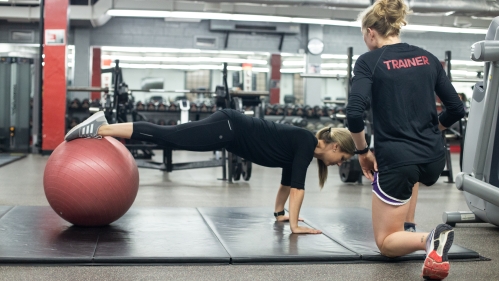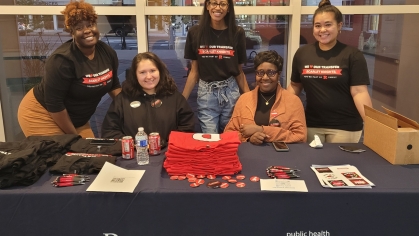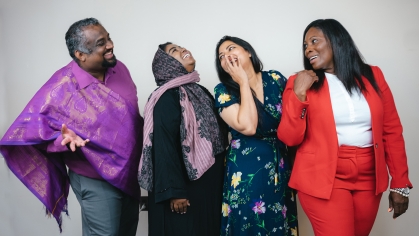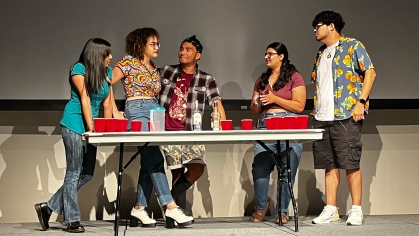Exercise is Medicine Engages Students at Rutgers–New Brunswick

Students have busy lives, and it can be difficult for them to balance their classwork, extracurricular activities, and on- or off-campus jobs, along with their personal lives and any other obligations. As a result, many of them need help creating the best exercise routine for their own specific situations.
From the perspective of the Division of Student Affairs, that’s where the Exercise is Medicine program—a partnership of Recreation , Student Health, the department of Kinesiology and Health, and the American College of Sports Medicine—comes in.
“For the most part, I meet with our clients, who might be students, staff, or faculty,” said Sonali Singal, who works as the Exercise is Medicine Coach for New Brunswick. “I talk them through the physical activity guidelines for physical fitness, and we then discuss ways to reach those goals in a way that works for them and their lifestyle.”
After an introductory call, where Singal learns more about her client’s goals, she creates a personalized exercised schedule for them, which they review (and modify if necessary) in a follow-up chat. Follow-up appointments are available for clients who would like to discuss progress and any needed changes.
Since the coaching program started at Rutgers in 2017, it has helped hundreds of clients engage in healthful exercise routines. Rutgers–New Brunswick has also been recognized with a “Gold” level campus by the American College of Sports Medicine, as Exercise is Medicine and related exercise initiatives—such as fitness classes in the Recreation Centers, personal training coaching appointments, and annual “Step Challenges”—have promoted a culture of physical activity on-campus.
For example, in fall 2022, the Step Challenge attracted almost 500 participants, who responded in an overwhelmingly positive way. “This was fun and easy,” said one anonymous respondent. “It was also well-timed to help me pivot towards a more healthy fitness routine.”
“When we started this program, we wanted to create a service that doctors or counselors in CAPS and Student Health could refer people to if they weren’t getting enough physical activity every week,” said Stacy Trukowski, who works as the associate director of Rutgers Recreation and is the lead exercise professional for the Exercise is Medicine program at Rutgers. "So we collaborated with our partners in the Kinesiology and Health department at Rutgers to establish the program together.”
And, for their part, Recreation’s faculty partners have helped support and expand the program.
“Clinically speaking, we’re passionate about helping people manage body weight as well as lower Type 2 Diabetes and Cardiovascular Disease Risk, among other conditions,” said Steven Malin, an Associate Professor in the Department of Kinesiology at Rutgers and supervisor of the Exercise is Medicine Program. “Exercise is a foundational aspect of health since it basically acts like a drug that lowers body fat, blood sugar (i.e., glucose) and blood pressure.”
“A program like this is just so natural within our community that integrates academics and health,” he continued. “The question becomes: how do we get people engaged in exercise? What are the barriers, and how do we help people overcome them?”
For others, including Wil Vargas, LCSW, who serves as the CAPS liaison for Exercise is Medicine, helping students overcome a variety of obstacles is crucial to their work.
“Getting students involved in exercise, especially when they experience marginalization, discrimination, and bias from their peers and others due to racism, ableism, sexual orientation, and gender identity, among others, can be very helpful and healing,” said Vargas, citing events like Queer Rock Climbing, Integral Hatha Yoga, and Hatchet Throwing as ways for students to complete stress cycles.
“Representation matters,” Vargas continued. “When students can share safer queer and affirming spaces with their peers while exercising, those experiences can help students feel more empowered physically, emotionally, and psychologically. Research shows that movement can even improve their ability to study, retain information, and sleep, among other benefits.”
Moving forward, Malin and Trukowski hope to promote the program with more expansive marketing efforts, connect more effectively with staff and faculty partners to advertise the program to the Rutgers community, and build out ways for students to continue to engage in the program from their first to their final year at Rutgers.
Everyone involved agrees about the value of the Exercise is Medicine program as it stands, however.
“I think that this is an incredibly valuable program,” said Singal. “There are a lot of personal and systemic barriers that people face when going to the gym, and having a certified personal trainer who can help you overcome those barriers and work out and get closer to a healthy routine is a great resource.”
You can check out Recreation’s programs, classes, and activities on their website. You can also sign up for a coaching appointment with the Exercise is Medicine program by clicking here.



